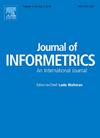论科学知识的时间多样性
IF 3.5
2区 管理学
Q2 COMPUTER SCIENCE, INTERDISCIPLINARY APPLICATIONS
引用次数: 0
摘要
了解科学知识的多样性对于阐明科学和创新的趋势至关重要。虽然跨学科性和团队多样性已得到广泛研究,但知识的时间多样性仍未得到充分探索。本文介绍了一种评估学术研究时间多样性的新框架。通过分析过去七十年中的 3100 万篇文章,我发现时间多样性呈上升趋势,这反映了科学知识的累积性。此外,我还发现,时间多样性与引用影响呈负相关,但与干扰呈正相关。这些模式在不同背景下都是稳健而一致的。此外,研究结果表明,时间多样性越高,干扰越大,这可能主要是由于使用了较早的参考文献。然而,时间多样性在引文影响力方面的劣势并不能完全由其他因素解释。总之,本研究阐明了时间多样性的动态及其对创新的影响,为科学的科学提供了新的框架,并为知识的时间多样性如何推动创新提供了证据。本文章由计算机程序翻译,如有差异,请以英文原文为准。
On the temporal diversity of knowledge in science
Understanding the diversity of scientific knowledge is pivotal for elucidating trends in science and innovation. While interdisciplinarity and team diversity have been extensively studied, the temporal diversity of knowledge remains underexplored. This paper introduces a novel framework for assessing temporal diversity in scholarly research. Analyzing 31 million articles from the past seven decades, I revealed an increasing trend in temporal diversity, reflecting the cumulative nature of scientific knowledge. Additionally, I found that temporal diversity is negatively associated with citation impact but positively associated with disruption. These patterns are robust and consistent across different contexts. Moreover, the findings suggest that higher temporal diversity leading to greater disruption may be primarily due to the use of older references. However, the disadvantages of temporal diversity in terms of citation impact cannot be entirely explained by other factors. Collectively, this study elucidates the dynamics of temporal diversity and its implications for innovation, providing new frameworks in the science of science and evidence on how innovation is driven by the temporal diversity of knowledge.
求助全文
通过发布文献求助,成功后即可免费获取论文全文。
去求助
来源期刊

Journal of Informetrics
Social Sciences-Library and Information Sciences
CiteScore
6.40
自引率
16.20%
发文量
95
期刊介绍:
Journal of Informetrics (JOI) publishes rigorous high-quality research on quantitative aspects of information science. The main focus of the journal is on topics in bibliometrics, scientometrics, webometrics, patentometrics, altmetrics and research evaluation. Contributions studying informetric problems using methods from other quantitative fields, such as mathematics, statistics, computer science, economics and econometrics, and network science, are especially encouraged. JOI publishes both theoretical and empirical work. In general, case studies, for instance a bibliometric analysis focusing on a specific research field or a specific country, are not considered suitable for publication in JOI, unless they contain innovative methodological elements.
 求助内容:
求助内容: 应助结果提醒方式:
应助结果提醒方式:


